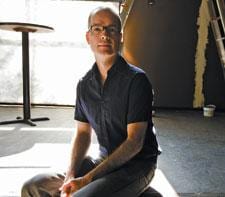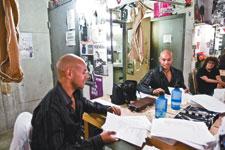
Credit: Jenna Wakani

RISKY BUSINESS. Buddies board president Paul Halferty says the company's approach to more challenging work is key to its success. Credit: Jenna Wakani

Credit: Jenna Wakani
For 30 years, the people behind Toronto’s Buddies in Bad Times Theatre have been a vanguard of queer artistic expression in Canada. Buddies is billed as the largest queer theatre company in North America and the only one with a permanent venue.
The theatre’s success is largely attributable to its bold artistic vision, which was celebrated most recently with six Dora Award wins for its 2008/09 season opener, Agokwe.
But Buddies is at what could be a major turning point in its history. Earlier this year the company’s administration announced a major budget shortfall. A large private-sector donor wasn’t returning and ticket sales had slumped by 25 percent from the previous year. The theatre cancelled two shows from its season, a move that helped contain costs and made performance space available for much-needed fundraising events. With some money already in reserve and with a new cash infusion from those events, the company says it has righted its financial ship, at least for the time being.
But the crisis was compounded by the sudden departure in January of general manager Jim LeFrancois, followed in May by the exit of artistic director David Oiye. Buddies hopes to announce a new artistic director in September with the launch its new season and plans to announce a permanent general manager shortly thereafter. The new artistic director will be responsible for the theatre’s artistic programming starting with the 2010/11 season. The 2009/10 season has already been announced.
Whoever takes the reins of the company will need to navigate a complicated set of challenges.
Buddies is defined by its mandate to promote queer theatre. It used to stand alone in that role but times have changed. Queer-themed theatre, particularly in Toronto, is no longer rare — Tarragon, Factory, Canadian Stage and Passe Muraille have all staged critically and commercially successful queer-themed productions over the last few years and have announced more to come. Some of the prominent queer artists who got started at Buddies have since moved on to these theatres.
But Buddies associate artist and company dramaturge Ed Roy says Buddies is still home to queer artists that remain marginalized.
“A lot of those voices are raw when they come to Buddies, or less palatable to a mainstream establishment,” Roy says. “Not to diss mainstream theatre companies but if you’re developing a play for Canadian Stage, they have an eye to a large, predominantly middle-class audience that they have to cater to.”
Buddies board president Paul Halferty says the company’s approach to more challenging work is key to its success.
“While Tarragon or Factory or Canadian Stage or any of these places might do a queer play, Buddies is also about challenging boundaries and creating new work that is challenging and risky,” Halferty says. “Agokwe is a perfect example of that risk. I don’t think you’d see another company premiere its season with the first play from a young artist but Buddies saw the potential and took that risk because it’s interested in supporting young artists.”
The company’s official mandate defines queer as referring not only to the lesbian, gay, bisexual, trans communities but to “anything different or outside of the norm,” an expansive definition that allows the company to program works by straight creators that lack gay themes but that push other artistic boundaries.
“Since its inception the idea behind [Buddies] was for artists to find their own sorts of expression,” says Roy. “It doesn’t mean they have to be radical or queer. They’re not judged for the people they are, but for the artists they’re becoming or are.”
Associate artist and Hysteria Festival director Moynan King says dual definitions of “queer” actually reinforce each other in the theatre.
“The most experimental, out-there and interesting work is done by the gays,” she says. “We’re always trying to reinvent forms to suit ourselves, to redefine what theatre is and to find our voices through it. I don’t think it’s accurate to separate them that way. Those non-gay experimental artists are drawn to Buddies because they see themselves in it.”
But some in the theatre community say that Buddies is losing touch with its core audience.
“Whether they want to admit it or not, the core audience is queer,” says Kamal Al-Solaylee, a professor at Ryerson University and former theatre critic for The Globe and Mail. “I know so many gay men who no longer subscribe because they’re sick of the work, or they only subscribe out of duty. That’s not sustainable for a theatre company.
“What they need [in an artistic director] is someone who knows what he or she wants, someone with a clear vision. The trouble with David Oiye was that during his tenure, every year it changed its focus. One year it was gay, one year it was experimental, one year it was mainstream. It lost its identity.”
Al-Solaylee says Buddies still has a role to fill as a theatre for the queer community.
“I think Buddies should go gay or queer,” he says. “The other theatres aren’t gay. They’re just doing the odd gay play here or there. They’re not consistently championing a gay point of view or perspective of any kind.”
Perhaps the most important challenge, then, will be wooing back theatregoers who drifted away over the past two seasons and finding new ways to sustain the company’s work.
“A good portion of that decline was as a result of the economy. Every theatre in the city was feeling it, as were the Stratford and Shaw festivals,” says acting general manager Shawn Daudlin.
But the economic decline also presents Buddies with an opportunity to shine, says King.
“Everyone’s playing it a bit safe. The economy becomes this excuse to not take any risks, which I think is really dangerous,” she says. “So if anything, institutions like Buddies are more important than ever because we are going through another shift and it’s so hard to get those things back if you lose them.”
The company’s programming goes beyond the mainstage season. It also runs the Ante Chamber playwriting unit, the Young Creators Unit, the Rhubarb Festival of experimental theatre, the Hysteria Festival of women creators, a month-long series of Pride events and the monthly QueerCab youth open mic nights and annual PrideCab youth cabaret.
“There’s always more that the company can do but it has to be within the resources available,” says Roy. “But it is a theatre and its primary responsibility is to create art.”
In addition, the company manages its building at 12 Alexander St, including rentals and weekly dance parties catering to the queer community.
“I think that’s often underestimated,” Roy says. “That’s a huge achievement. [Taking over the space] saved that building and gave a space to all the other theatre companies who come in and rent the cabaret, and all sorts of community fundraising events for HIV/AIDS and so on. Buddies saved that venue and that’s available to the community.”
Already there are small signs that Buddies is bouncing back from last year’s ticket slump. After offering a 20 percent discount to previous subscribers and making new subscriptions completely flexible, the theatre has seen subscription sales rise compared to this time last year.
Perhaps more encouraging is that the upcoming season, featuring only works by female creators has driven a spike in donations and subscriptions from female patrons.
“We’ve certainly seen an interest in female buyers who want to support the theatre, not only on subscription sales but in individual donors who want to support the season and female creators,” says Daudlin. “We always had somewhat of a female audience. Those numbers were low. I’m not sure we were specifically trying to reach out [with the all-female program]. I think it had less to do with reaching out to a new audience than it was an artistic decision to reach out and work with female creators. We did notice that a good majority of our creators were male, so we wanted to give females a shot.”
Buddies plans to expand its targeted outreach plans with the addition of a junior marketing position that will focus on expanding the audience base. It also plans to release a detailed financial picture to the community later in August, to reassure community members and thank them for their ongoing support.
“Certainly the community knew the hardships we were going through, and we want them to know how the fundraising helped us and how the community supported us,” Daudlin says.


 Why you can trust Xtra
Why you can trust Xtra


